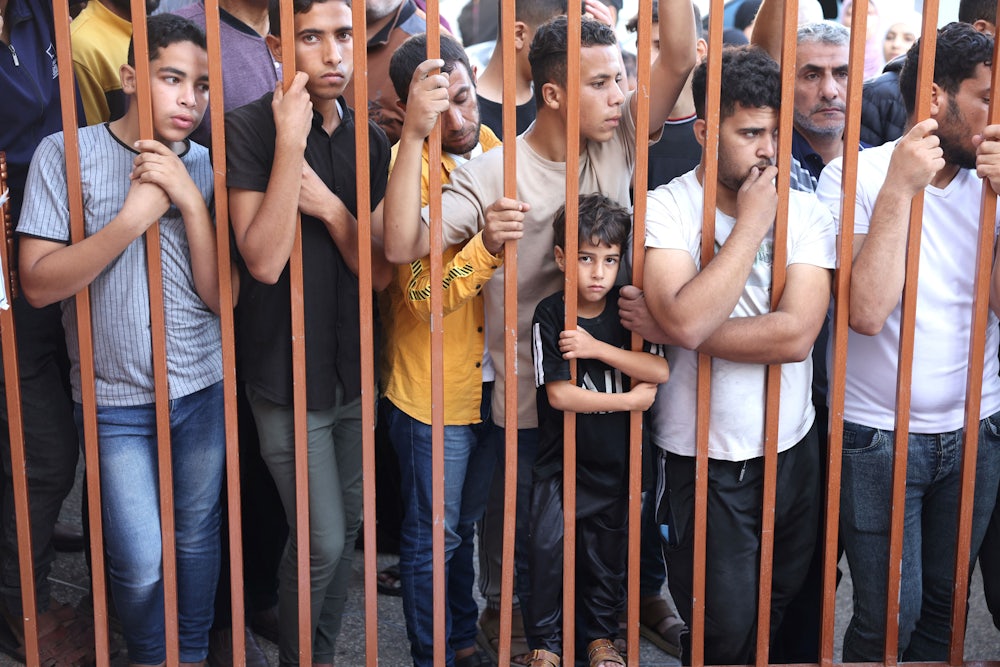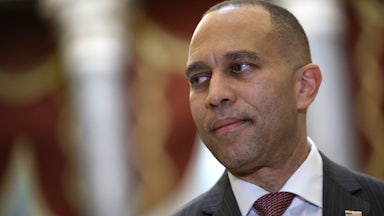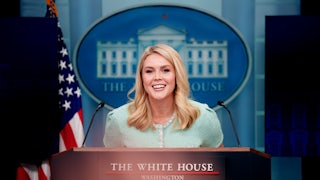Israel has warned that the war against Hamas in Gaza could stretch for “weeks and months.” But if the start of its ground operation has been murky, Israel’s overall aims are not fully clear either: Defense Minister Yoav Gallant has said the aims are to destroy Hamas and end all Israeli responsibility for Gaza. Few know precisely what these aims mean in practice. But the longer-term fate of Gaza is the most troubling question of all.
Speculation on Israel’s potential plans boils down to two main paths: One is reoccupation of the Strip, including either expulsion of Palestinians, as per a leaked government document, or by turning Gaza into a “super-camp” as per one international analyst working closely with Palestinian society, with no political leadership at all and only international humanitarian service providers. The other plan Israel might consider is the reintroduction of the Palestinian Authority, an entity that Palestinians detest for its unaccountable, authoritarian governance by a body viewed as Israel’s quisling. The only other scenario is no plan; Gaza descends into a raging competition of ungovernable armed militias—call it the Mogadishu outcome. It’s a short, and grim, list.
The International Option
International actors can’t solve the situation. But of the short list of bad options, some form of international intervention might be the least bad.
There has been a recent wave of interest in the possibility of international intervention as an alternative approach: Former U.S. Ambassador to Israel Dan Kurtzer warned of not repeating mistakes made by America in Iraq; former U.S. negotiator Dennis Ross envisioned an interim administration run by “Palestinian technocrats—from Gaza, the West Bank, or the diaspora—under an international umbrella, which would include Arab and non-Arab nations.” In Foreign Affairs, Steve Simon, who served on the National Security Council in the Clinton and Obama administrations, called for “temporary stewardship” under the United Nations via a U.N. Security Council Resolution. East Timor during its long transition period to independence is one example. Simon, as well as New York Times columnist Bret Stephens, also mentioned Kosovo.
Kosovo’s experience warrants some inquiry and suggests a few starting points for comparison. In the 1990s, as Yugoslavia disintegrated, it fought the independence movement of Albanian nationalists in Kosovo, the erstwhile autonomous province within Serbia. By the late 1990s, the Kosovo Liberation Army took up arms, prompting a furious and violent reaction by Serb and Yugoslavian forces, including the expulsion of over 800,000 Albanians, both before and during the full-scale war with NATO. In March 1999, the United States took the lead in NATO’s military intervention—the first but not the only major difference between the two cases—to effectively drive the Yugoslav (Serbian) forces out.
The day-after dilemma was similar: how to govern Kosovo, since the Federal Republic of Yugoslavia was deemed to have lost its right to rule, yet without determining the final political status of the dispute, which could not be resolved just then (and never has been since). The next question was how to maintain security—how to protect Kosovo from Serb aggression and how to protect the minority of Serbs still living in Kosovo from the threat of violent retribution of Albanians.
In June 1999, the U.N. Security Council adopted Resolution 1244, establishing what was effectively “temporary international governance,” in the words of Marc Weller, a professor of international law at the University of Cambridge, speaking by phone from the U.K. He is also a former U.N. senior mediation expert, and has advised numerous peace processes, including Kosovo; he wrote a book about the latter.
Broadly, the Security Council aimed at the two main prongs of security and self-governance. Without decreeing the final political status, the resolution created an “international civil presence” that would ultimately help organize and supervise “development of provisional institutions for democratic and autonomous self-government pending a political settlement, including the holding of elections.”
The mission included a peacekeeping force, and 1244 ordered Yugoslavia’s forces out. It demilitarized the KLA. The Kosovar Albanian fighting force was to be reintegrated into civil society and, during the transition phase, its members were allowed to take both administrative and police roles, even though Yugoslavia considered them to be terrorists. Moreover, the resolution stipulated that Yugoslavia was allowed to bring a limited number of security forces back, for very specific needs, including liaising with the international civil and peacekeeping (security) missions.
The implementation of this plan in Kosovo has been complex, with mixed results. The final political status was famously left open, and as a result the conflict remains unresolved and there have been harrowing recent close calls of resurgent conflict. But Kosovo also built governing institutions, stabilized, and declared independence in 2008. Despite the alarming recent incidents, ethnic violence has not flared since 2004. Simon, in Foreign Affairs, stated: “The UN has managed relative success [in Kosovo] in a fragile environment.”
So Much Could Go Wrong
At first glance, there are vast differences that cast doubt on whether the experience is applicable. For one, in Kosovo the “occupying force,” i.e., the international community, “was welcomed as liberating heroes,” observes Weller. If Israel were to reoccupy, clearly it would be perceived by the Palestinians as an epic enemy—a fast formula to disaster. And if an international mission essentially supported Israel’s aims, then “the international presence would be seen as an instrument to perpetuate the authority of the perceived aggressor, Israel, in particular in relation to the security function and in relation to the suppression of a revival of Hamas in the territory,” said Weller. A Palestinian analyst in the region, who preferred to remain anonymous, added, “The trust of Palestinians in the international community is going to be very, very, very low. It was already very low before that and will be lower now.”
On the other hand, several Palestinian legal experts and policy analysts note that the Palestinians have been asking for international protection at the U.N. for years. Omar Dajani, a Palestinian American law professor at University of the Pacific and a former negotiator for the Palestinians, concurred: “Palestinians who have long called for [international actors to protect them] would be open and even enthusiastic about the prospect.” In interviews and conversations, several other Palestinian law and policy figures made this same point.
There are other thorny obstacles. In 1999, Russia, a sworn ally of Serbia, which bitterly resented NATO’s intervention, nevertheless voted in favor of Resolution 1244. China abstained; neither used its veto power. Given the profoundly changed political dynamics on today’s Security Council, and the deep enmity between Russia, China, and the Western powers at present, such collegiality seems far less likely today (though not impossible).
Perhaps the most formidable obstacle to an international mission is the issue of security—that is, Israeli security. After the breach of Israeli sovereign territory and Hamas’s horrifying attack on civilians, Israel will surely insist on setting its own terms of security over Gaza—though it has hardly demonstrated its success at doing so. If Israel is against an international mission due to security concerns, the U.S. could be the country to use its Security Council veto.
And if a resolution passes that satisfies Israel and the U.S., it will probably produce a security mission so restrictive as to be like another occupation, with no horizon for final status in sight. Gaza would be treated as a separate entity in Israel’s mind, like today. “The concerns are that this can’t be done just in Gaza … it could easily entrench the separation paradigm,” said Dajani, referring to Israel’s years-long policy of cutting off Gaza from the West Bank through severe movement restrictions between the regions and deepening the political wedge between Hamas and Fatah. Israel also broadly characterizes Gaza as its own specific problem, or neglects it entirely when considering the larger Palestinian issue. “In that case it would put the international community in the role of being Gaza’s jailkeepers, and no one should want that role.” Similarly, Michael Wahid Hanna, U.S. director of the International Crisis Group and a Middle East expert, noted that even Arab countries wishing to help stabilize the region would shy away in such a case. “What Arab country would agree to that? You’d be subcontracting the Israeli occupation.”
And yet if an international mission is aimed primarily at reintroducing the P.A., as per Steven Simon’s position, and, apparently, that of the Biden administration, there is a real danger of replicating precisely what Palestinians resent about the P.A. in the West Bank, said the unnamed Palestinian analyst. He mentioned the corruption and lack of accountability, but also the political suppression of people affiliated with Hamas in the West Bank, which sours Palestinians on the putative democratic process. This problem seems intractable: After October 7, is anyone willing to gamble that political integration of Hamas could make it more moderate? But sowing the seeds of an entrenched, unrepresentative, venal government under the P.A. is what set the stage for Hamas’s victory in 2006 to begin with.
Finally, some argue that it is too early to worry about the day after the war. In this view, all attention should be focused on a cease-fire, to end the horrors Israel is inflicting on Gaza’s population. This may be true, but the day after has a habit of sneaking up while the parties are unprepared.
Smoothing a Troubled Path
An international approach is rife with problems, but the other paths are worse. According to media reports, the U.S. is also coming to view an international effort as a plausible direction, though rumors of U.S. peacekeepers in Gaza set off alarm bells and a White House denial. The more significant question, then, is what kind of international approach takes shape; what principles should be adopted to help make this path into a genuine option?
The analysis suggests several such principles. First, drawing on the Kosovo experience, the mission must distinguish between installing or manufacturing an international government and providing all needed support to reconstitute a genuine representative form of governance reflecting, eventually, Palestinian self-determination.
Second and related to the first, it is notable that so much attention is focused on Israel’s plans for Gaza. Israel has lost, or never had, the right to determine the fate of Gaza—Palestinians do.
Third, Israeli security is an essential aim, but one that was not achieved through Israel’s principles of the last 16 years—a higher wall; emboldening a repressive, violent regime; and no political horizon. These failed.
Finally, any approach that is tailored to Gaza alone is doomed. This approach perpetuates Israel’s control over the fate of Palestinians, by adopting Israel’s Gaza–West Bank separation policy, and it reduces Gaza to a security problem with a technical solution. A serious international approach must treat Palestinians as the people they are.
The moral force and the historic role of the international community—if the term is to have any meaning—depends on that community proving it can help build a better path for the future.










